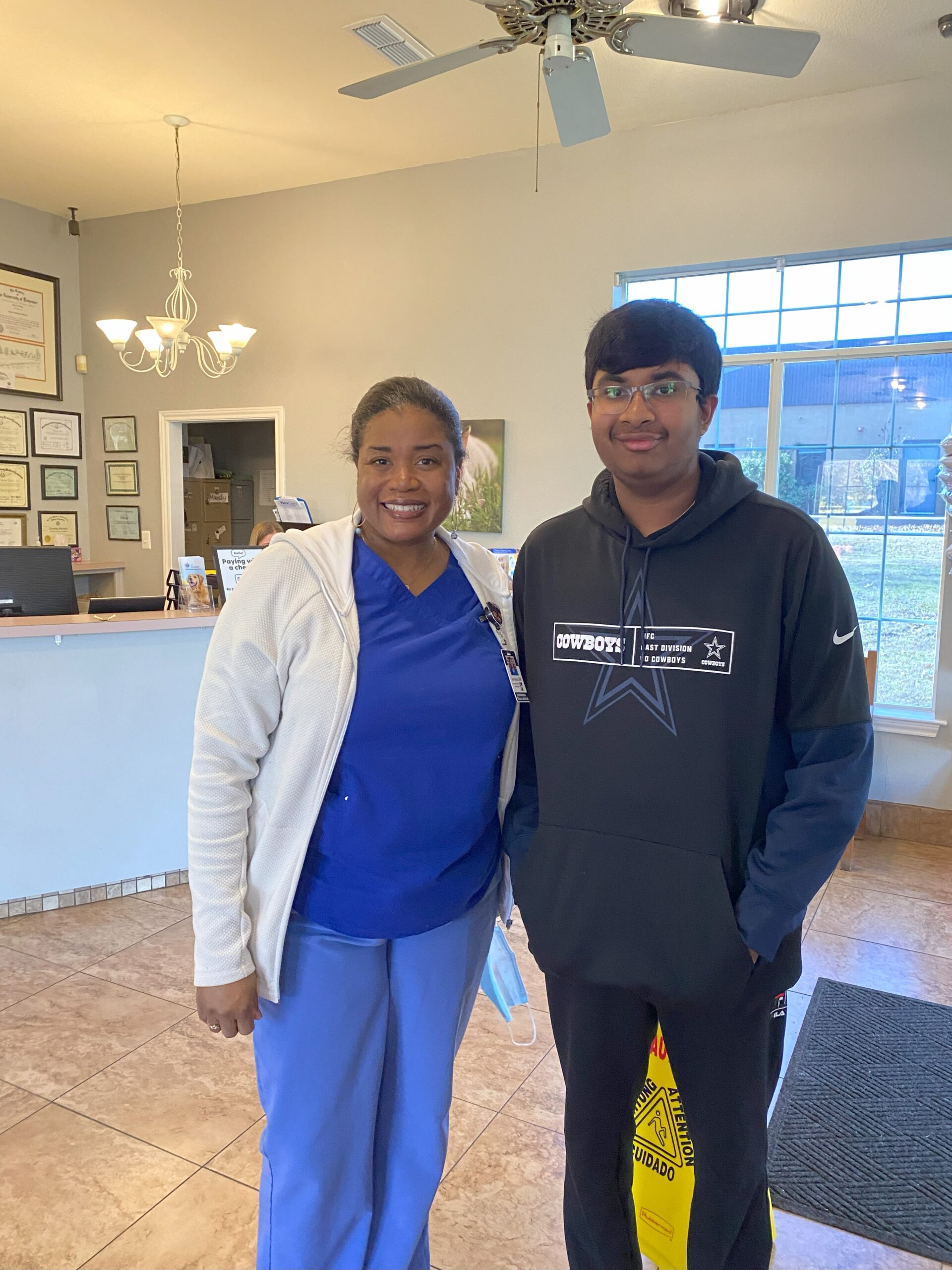
Dr. Rachel Speed
A Veterinarian at Trophy Club Animal Hospital has over 18 years experience working in both day practices and emergency hospitals.
Q:Can you briefly introduce yourself and your background as a veterinary doctor and tell me about what inspired you to become a veterinarian?
A:So I have been a veterinarian, I graduated in 2007 from Texas A&M University. I wanted to be a veterinarian since I was a little girl. So I wrote a little book about it in 2nd grade. I have always been passionate about helping animals, rescuing animals, kind of making them.. I just related to them a little bit better than people I feel like. It seemed like they are helpless and don’t have a voice, and so I am just a little bit passionate about helping them. I applied to Vet school right after my 2nd year undergraduate, got in after my 3rd year. So I am a high school graduate of 2000 and a vet school graduate of 2007. I have always been passionate about small animal medicine, but then I on the side, kind of hang out with large animals. I don’t work on them, but that is kind of my fun and pleasure away from work, if that make any sense at all….
Q:I am also planning on applying for Texas A&M. So how hard was it to apply and to get in? A:I do think things have changed a little bit since I was there, but it is a very rigorous situation. When I was there they were only taking about 80 students in Texas, where you have multiple human medical schools and the animal ones were less, but in the last 5 years there has been a shortage of veterinarians. So they have actually opened up a satellite clinic for Texas A&M and Texas tech has a veterinary college. So there are quite a few more opportunities. I still think it is a pretty difficult process, so you really want to focus on that experience as well as your grades. And showing some sort of direction.. like figuring out what you are wanting and how you are going to make that application better. And I would encourage, if you are really serious about it, reaching to the University and asking them, dear admission office, how you can make the application better.
Q:In general which pets need vaccination and which pets do not need?
A:Your dogs and cats are the pets to focus more on. So that is your preventative care pets. Your hamsters, Guinea pigs, birds and reptiles, to my knowledge, there are no vaccinations. Your dogs and cats do. It is far more important to vaccinate the young, your senior dogs that have had routine care tend to have immunity. They are already protected and their immune systems have developed. So they are not needing routine vaccinations, but on the other hand they are needing more routine and regular physical examinations, and investigations to make sure that their organ systems are healthy. We generally recommend that these pets come in annually for exams, and as the pets get a little older we will see them twice a year. The importance of regular checkups for pets is that you can listen to the heart, lungs, look at the capillary refill time, feel the abdomen, see if there is anything that is indicating a change, so that we could adjust their diet, or environment and kind of deal with issues before they become huge. Obviously we want to keep them healthy longer.
Q:Key signs and symptoms that a bit maybe unwell or sick.
A:It depends on the condition. But some of the main things were looking for is their appetite, and if they are eating and drinking. It is always better to feed meals or measured quantities so that you can pay attention and notice the subtleties. So if your Labrador always finishes the meal quickly but is now taking more than 10 minutes then there is something wrong. So paying attention to their appetite, their drinking, and energy levels in general, so when dogs tend to sleep more- Lot of people are like he is just getting older. Perhaps they don’t feel good and you are not attributing it to age is not appropriate. These guys can’t advocate for themselves. Watching them defecate, Urinate , frequency of those things – you can detect abnormal stuff
Q:What is your guidance to ensure beginner pet owners are providing a balanced and healthy diet for their pets?
A:Whenever we have new clients, we go over diet extensively at the very first first. There is lot of confusion in the world. There is ton of marketing that plays a role of diet in the animals. Nobody is regulating pet foods. People buy stuff based on whats cool and not based on research. We spend a lot of time talking to them about research formulas and diet that promote longevity. The Smaller the brand and less exposure the pets have the harder it is to determine if its not balanced. Because it takes 8 – 1- years for us to figure that out and lot of pets are affected.
Q:Please give some pointers and advice about grooming and hygiene for pets.
A:It totally depends on the pet. One of our most popular breeds are Doodles. Poodle mixed with something. These dogs have a lot more hygiene needs than other dog breeds that we have dealt with in the past. They need routine grooming and bathing. SO its breed specific.I recommend your standard pets to get a bath twice a month with a hydrating shampoo and a conditioner. If they are not getting Hydrating shampoo & Conditioner then twice a month is too much. Birds don’t need a bath. Reptiles often benefit from soaking which is a maintenance for these species. They are all a bit different. Chameleons – Need specific temperature as they dont belong here. They are the hardest reptiles to maintain. If anyone is getting a reptile I would suggest they do a lot of research. As people don’t know how to provide the right heat or light, reptiles easily get sick.
Dr. Lynn

Q:Can you briefly Introduce yourself and your background as a Veterinary Doctor and what inspired you to become a Vet?
A: Im Dr. Lynn and I graduated from University of Alabama. I had a love and passion for animals from childhood and had a cat. Took science during undergraduate years and instead of going into medical school I wanted to become a Veterinarian. Inspiration is owning the pet and I wanted to do better with more animals.
Q:Which are the pets that need vaccination and which are the ones that don’t need all that?
A:Primarily Dogs & Cats , Ferrets. All animals need some sort of preventive care. The nice thing about Vet medicine is that there are specialists who are specialized in exotic care , they know what to do, like in zoos. But i would say dogs and cats need the most as far as preventive care with vaccines
Q:Please briefly explain the importance of regular check-ups for pets, and how often beginners should take their pets to the vet.
A:Regular checks are imperative.